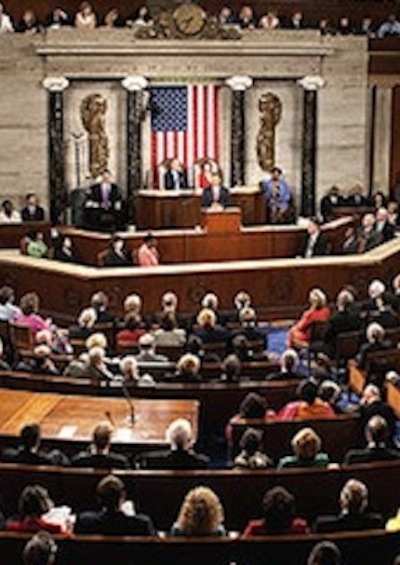Why Even Democrats Should Vote for Speaker Ryan
As Americans must regain their respect for one another, how far should Democrats go to work with Republicans now?
December 31, 2016

The level of disagreements inside the United States today is reminiscent of those inside the former East Germany.
No doubt, hard political battles lie ahead. The question is whether Americans can display the comity to work through those encounters without breeding political paralysis, prolonging an era of polarization and ill-will.
For example, knowing that they cannot elect their own leader as speaker of the House, Democrats this coming Monday could do something surprising — signal their willingness to work across party lines (within reason) by casting a vote for Paul Ryan to hold that office.
A potent appeal for bipartisanship
Democrats have often been blamed for offering up premature concessions that come to hurt them politically. Much of that is true. However, the step that I am proposing is different in nature.
– The United States in 2016: As Distrustful As the GDR?
– Why Even Democrats Should Vote for Speaker Ryan
It ultimately costs the Democrats’ nothing in real substance, but is symbolically important.
In a country whose electorate is badly frayed, they could offer up a gesture that is designed to provide some healing. If Speaker Ryan were to respond, and rule more inclusively (rather than immovably with an iron partisan fist), Democrats would have a lot to gain.
As things stand, the minority party in the House of Representatives accounts for next to nothing when it comes to passing legislation.
Nancy Pelosi, the Democratic leader, is known to be a fighter for her party’s cause. If she would show the magnanimity and vision to encourage such a vote, it would be hard to interpret as (another) step by Democrats to cede the role of honest opposition prematurely.
Pelosi could make clear that such support would not in any way prejudge the Democrats maintaining independent policy positions.
And she could stress that such a step was designed precisely to convey respect for the office and to invite Ryan to search for broader alliances, beyond just Republicans.
A Speaker for all
At minimum, it would serve as a reminder that the House Speaker is (in theory!) a position representing the whole chamber, not just one party, and is in the nation’s constitutional line of succession after the Vice President.
More broadly, however, opening the possibility of bipartisan coalitions – almost a fleeting historical memory at this stage in U.S. politics — could help relieve the pressure on the speaker to follow the so-called Hastert rule instituted in 2004.
Under this crude tool of enforcing partisan loyalty (in the presumed spirit of preserving party unity), Republicans have refused to allow floor votes on bills in the House of Representatives unless a majority of their party caucus supports them – even if a majority of the House and the Republican leadership supports the bills.
That counterproductive practice empowers the most extreme members of the Republican majority and severely constricts the Speaker’s ability to bargain.
It played a major role in the resignation of former speaker John Boehner, even after he occasionally abandoned the rule and sought the votes of Democrats to override his obstructionist hardliners during crises.
Combating vitriol
In the Senate, it behooves Democrats to be as generous as they can in considering the incoming president’s nominations – at least on those who are not transparently unqualified – and policy recommendations. There will be ample opportunity and necessity to oppose the administration.
Likewise, Senate Republicans need to display early and often a commitment to seek consensus on major issues. Otherwise, the legislative gridlock that has marked recent decades may only worsen.
Amid such uncertainty about the purpose and direction of the executive branch, it is Congress and the courts that will have to be the stabilizers of government.
Who will do the healing?
Whatever develops regarding future Supreme Court nominations, Chief Justice Roberts has shown prudence in shaping judicial conduct. He will need that strength even more.
Most problematic are the specific initiatives that a Trump presidency will mount. Donald Trump has much to prove.
Even his supporters must recognize that he has demonstrated no capacity for healing the social frictions he has exacerbated.
How will he react to the mixed reception his proposals are bound to receive? Truman’s maxim about being able to stand the heat in the White House kitchen stands as a particular test for Trump.
Trump’s ability in that regard is not helped by the fact that he evidently yearns for constant praise and approval — and bristles at criticism.
Future jokes are on him
A sobering reality for Trump will settle in soon. Now that Hillary jokes are passé, humor at the incoming president’s expense will undoubtedly persist and grow.
Trump’s remarkable habit of asserting as true statements that have no basis (other than as revealing his own preferences) have already elicited a pattern of ridicule by the media.
This is true even though the media clearly relish the fact that they now have an entertainer as President, which promises an eternal campaign (and high click rates).
In the past, even the least popular presidents of United States have enjoyed some sort of grace period from the press. However, signs are that Trump may have no similar honeymoon.
Whether he can ignore or rise above the caricatures that will emerge remains to be seen.
No help from the global environment
At home and abroad, the coming years will bring serious peril. To a significant degree, that peril will wax or wane depending on the performance of Donald Trump as president.
Yet, no matter who occupies the White House, the health of the American republic will depend on how well the broad swath of Americans manage to overcome the exceptional animosities that shaped the 2016 election.
Most Americans respect the office of the president, but many cannot ignore the qualms they feel about the man who now assumes the office.
The only way out
What they must do is find ways to reaffirm their respect for one another.
The task begins with the presumption that, wisely or unwisely, every ballot cast reflected the voter’s belief that it would advance the national interest. That shared intention is the vital bond Americans should never relinquish.
Takeaways
As a symbolic act, House Democrats should consider casting votes for Speaker Paul Ryan.
There are symbolic concessions that cost nothing and there are policy concessions. Democrats should distinguish.
Tthe health of the US republic depends on how well the broad swath of Americans manage to overcome exceptional animosities.

